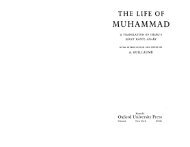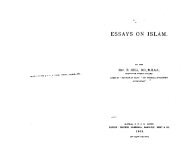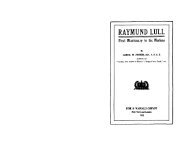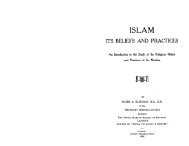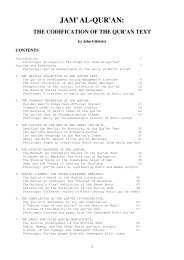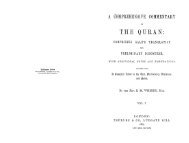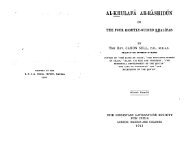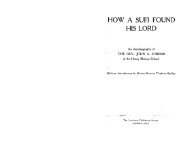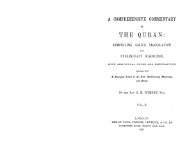Wilson-Apostle To Islam.pdf - Radical Truth
Wilson-Apostle To Islam.pdf - Radical Truth
Wilson-Apostle To Islam.pdf - Radical Truth
Create successful ePaper yourself
Turn your PDF publications into a flip-book with our unique Google optimized e-Paper software.
CHAPTER THREE<br />
GIRDING ON HIS ARMOUR<br />
"At about the time of the graduation of the first class, in 1866, a theological<br />
seminary was started in the little city of Holland, which remains<br />
today under the name of Western Theological Seminary. So great was<br />
the "enthusiasm for higher education that the people dared almost anything,<br />
under the spur of the eloquence of their leaders. It was Dot considered<br />
fantastic to establish a post-graduate school the moment the college<br />
turned out its :first class. The whole system - academy, college, seminary-was<br />
thought of as one training school. So great was the people's<br />
zeal that at one of the early commencement exercises sa hundred persons<br />
assembled to listen to the oratory. The program that faced them1 and<br />
that apparently they absorbed with relish, began at eight o'clock in the<br />
evening and continued till two in the morning!"<br />
..111UnCa1tS from Holland,<br />
BY AR...~OLD !vfliLDElt,<br />
p. 209.<br />
Henry van Dyke in his S firit of America says, "The typical American is<br />
a person who likes to take care of himself, to have his own way, to manage<br />
his own affairs .... He is an individual, a person, and he feels very strongly<br />
that personal freedom is what he most needs, and that he is able to make<br />
good use of a large amount of it." This was certainly the feeling of the<br />
Dutch pioneers and much of this spirit in American life came from their<br />
contribution. \:Vl1iIe certain forces operated to keep them within their own<br />
community and to maintain the language and the ways of the Netherlands,<br />
there was always more than enough of individualism to balance the former<br />
spirit; it has been aptly said that "stars were constantly shooting out into the<br />
life of the lusty young nation grO\ving up around them."<br />
These men from Holland were for the most part extremely conservative;<br />
however, the one adjective most often used to describe them is possibly<br />
"solid." Their historian Mulder has remarked that like the Scotch, they<br />
have often been charged with penuriousness or parsImony, or they haye been<br />
called plain "tight." But their attributes in this regard may better be linked<br />
to 'lcommon sense. 11<br />
They were ready to support the cause in "\vhich they<br />
believed and they would give with liberality and self sacrifice to education, to<br />
missions, and to their church.<br />
Dr. Zwemer himself paid them tribute in an address he gave in 1937 at an<br />
anniversary of Hope College. He said, "They never steered by the weathervane<br />
of public opinion, but by the com'pass of conviction . . . The whole<br />
policy in the new colony was based on thrift and industry, on education and<br />
self reliance, on a home and a church and a state where true liberty was<br />
enthroned!'<br />
The pioneers in Michigan redeemed the wasteland as well as the good,<br />
and from the black ooze of the swamps they cut out year after year the roots<br />
that had grown through centuries and finally gave celery to the American<br />
table and to much of the world. Arnold Mulder tells us in his book Americans<br />
from Holland,' that almost before they had a roof over their heads they<br />
would begin to build their church. Of the specific project which resulted in<br />
the schools at Holland, Michigan, he goes on to say that the famous Dutch<br />
pastor, Dr. A. C. Van Raalte, began talking of a college as the first blows of<br />
the a.."{ fell in the wilderness. .<br />
Soon he was instrumental in getting an academy under way. This he<br />
wished to eularge looking toward a college. When a call came for him to go<br />
1. Amerie:o..ns from Holland. by Arnold Mulder; J. B. Lippincott Co., New York, 1947, pp. 320.<br />
25



